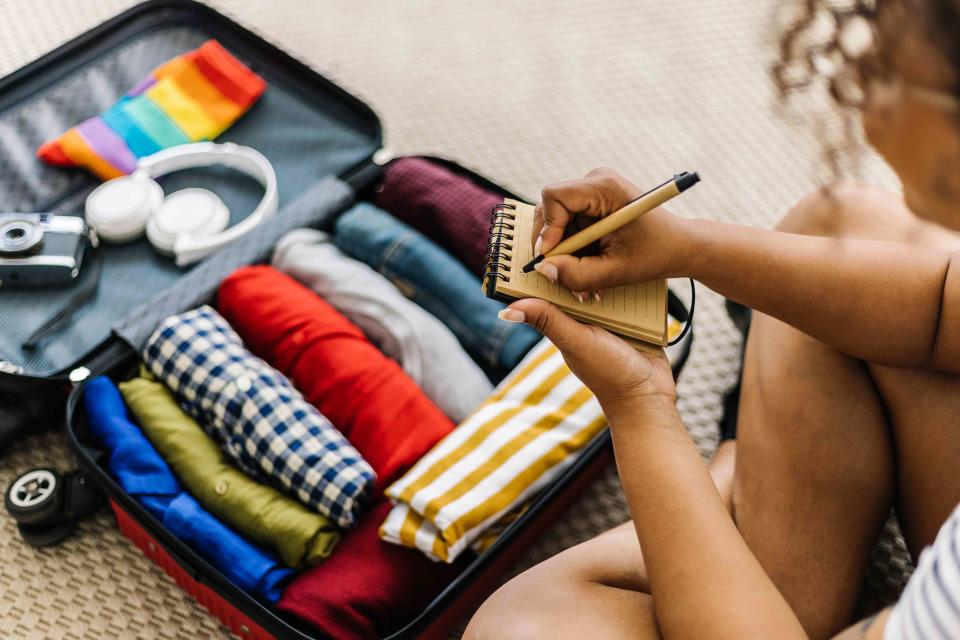10 Essential Home Tasks to Check Off Before Leaving for Vacation
Here are some essential tips to get your home in order before you're on your way. Make light work of cleaning and organizing, to enjoy a carefree vacation.

Xavier Lorenzo/Getty Images
Getting ready for a holiday? Whether it’s a weekend vacation or an extended getaway, ensuring your affairs are in order is an important part of pre-departure planning. From purchases to packing, your to-do list may be so long that it is easy to skip steps when securing your home before you walk out the door. Be sure to check off these 10 essential home tasks for a stress-free vacation that will help you get right back into the swing of things as soon as you return home.
1. Eat, Freeze, or Donate Perishable Foods
The last thing anyone wants is to come home after a relaxing vacation to rotten food in the fridge or on countertops. Be sure to plan meals, freeze fruits and veggies, or donate items to friends, family, or neighbors. Prevent food waste by giving any canned or jarred goods set to expire to a local food pantry.
Related: Can I Eat Food Past Its Expiration Date? Here's What Experts Say
2. Do the Dishes
A sink full of dirty dishes attracts pests and odors. Even if it’s just a weekend jaunt, you can be sure that if you’re not interested in washing dishes before you go, you’ll be even less interested after you come back. Tackle dishes before you head out. Run the dishwasher cycle or hand wash, so your kitchenware does not develop bacteria or stenches.
3. Empty the Trash Cans
Just like dirty dishes or rotting food, full trash cans are unpleasant welcome-home gifts. Avoid this hassle. Take out all the trash and recycling before leaving. If you depart on a day that doesn’t easily coincide with trash pick up, ask a neighbor to assist in taking your full bins curbside. Also, to avoid theft or fines, ask them to bring the emptied bins back to a secure location. If all else fails, drop off the trash in city or county rubbish dumps before you depart.
4. Unplug Electronics
Unplug electronics that don’t need to run. Even when electronics are plugged in but are not in use, they use some standby power. Unplugging them all together can reduce electricity bills and protect appliances against unexpected power surges. Prime candidates for unplugging include lamps, phone chargers, toasters, coffee machines, alarm clocks, and electronic toothbrushes. To reduce the risk of minor electrical hazards, plug anything else into a GFCI socket or surge protector.
5. Adjust the Temperature
Set the thermostat to a cash-saving temperature. Depending on the season, this may mean turning off the heat or air conditioning completely. But, if it is the dead of winter or the height of summer, you’ll need to find a happy medium. Adjust the temperature right before leaving home and use any SMART settings to auto-adjust the thermostat throughout your vacation. Of course, do not leave any space heaters or window air conditioners running while you're gone.
6. Provide Backup Access
No one expects an emergency at home while they’re on vacation, so plan for the unexpected. Be sure to hide a spare key in a not-so-obvious location like your car, a friend or neighbor’s home, lock box, etc. Ensure that any pet or house sitters know exactly where to find it. If you have smart locks, share the code with visitors or others you trust.
7. Hold Mail, Papers, and Packages
Leaving important mail or packages on the doorstep for long periods of time is risky. Put a hold on any deliveries, re-route any packages, or ask a trusted neighbor to pick up mail or boxes left on your stoop. You may also be able to ask specialty delivery stores to place items on a back or side porch, where they are more likely to be in safekeeping. Remember, take particular care if you're expecting important documents or packages during a season prone to rain or inclement weather.
8. Lock the Windows
It’s hard to forget about locking the front door, but many people forget to lock windows, door screens, and back or side doors. It may seem hard to believe that cat burglars still exist, but thefts on higher floors can also happen. Cover your bases by securing any access points, including crawl spaces, fire escapes, and garage door windows. Enable any security systems to sound with window access or motion detection in vulnerable areas.
9. Water Houseplants
Keep indoor and outdoor plants thriving when nobody’s home by giving them a good watering before leaving. If you’re away for an extended period and no one else is available, try self-watering spikes or globes. Don’t forget to prepare for backyard gardens or grass that will be left unattended during the heat of summer.
Related: How to Water Your Houseplants
10. Close Drapes, Curtains, and Blinds
Closing drapes, curtains, and blinds before leaving keeps the home cool and prevents overheating from the sun. It saves energy and denies peepers the chance to sneak a look inside and realize that no one is home.
For more Better Homes & Gardens news, make sure to sign up for our newsletter!
Read the original article on Better Homes & Gardens.

